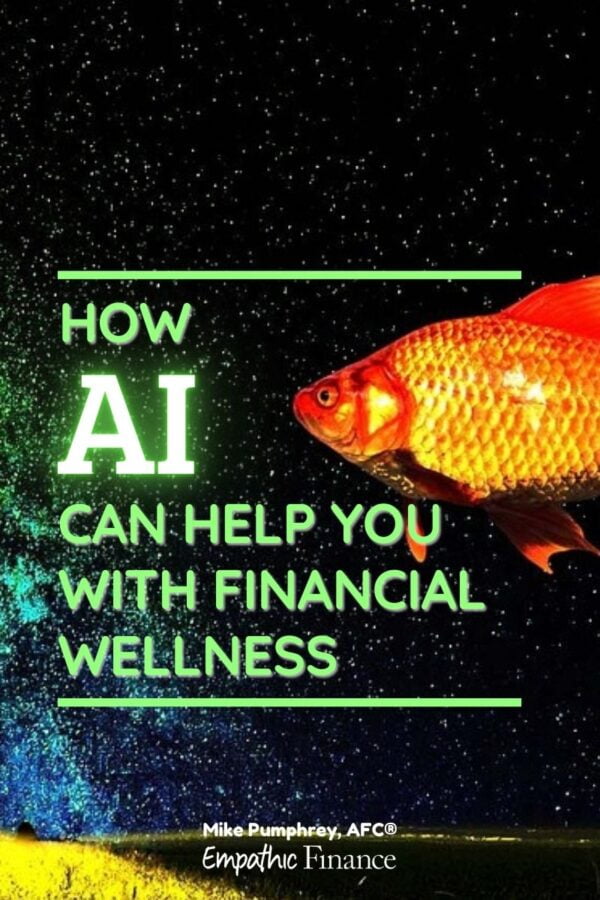With AI seemingly taking over the world, it’s worth asking if there are ways AI can help you with financial wellness. Spoiler: There aren’t.
AI (Artificial Intelligence) is everywhere. It’s on the tip of everyone’s tongue, from the news to the financial markets. ChatGPT, which sort of jump-started the AI gold rush in the public’s imagination, had at one time the fastest-growing application userbase in history.
Every product that’s out there is trying to “pivot to AI” right now, installing “magic” features in software, and in many cases, changing the company name to show their commitment to AI.
In short, everyone, it seems, is getting into AI.
So what does that mean for us here, those who wish to be intentional and mindful of our money so that you don’t need to care about “spending less” and instead have the money we need to live the life we want? How can we use AI to help us?
Table of Contents
Sorry
In short, you can’t.
I’m sorry to hijack this blog post to where you didn’t think it was going, but this all needs to be said.
AI, specifically Generative AI (which is the kind of AI that’s in the spotlight right now) has no fundamental use in financial wellness, at least the kind that we teach around here.
More to the point, AI has no fundamental use in most industries and applications, despite much trying to find it. It is a solution in search of a problem, and it’s an expensive one at that.
Perhaps it’s worth talking about what AI does, to see why AI plays no role in any of the work we’re doing here with our money.
Spicy autocomplete
Like many of you, I was initially excited and a little unnerved when I first heard about ChatGPT back in 2022.
I saw the demos of its frankly quasi-magical ability to answer questions with expert knowledge, generate content (including blog posts), and even create images whole-cloth from text inputs.
My first thought was, “wow, a lot of people are going to lose their jobs over this.”
And I wasn’t alone. Many people jumped on the “AI will cost millions of jobs” bandwagon.
Then I learned more. I learned that generative AI doesn’t actually “reason”, “think” or create anything that didn’t already exist. What AI does is it looks at a vast trove of data and makes decisions based on what it thinks most likely matches the patterns.
So when confronted with the phrase “The red mailbox is…” it’s unlikely to say “dragon”, because none of its training data says that. It’s more likely to say “large” or “open” or “empty.” And at the end of the day, it just makes its best guess.
When you realize that AI is just a guessing machine and not “your plastic pal who’s fun to be with“, you start to turn into this guy:
The next big thing
What we’re seeing is another iteration of the tech/investment phenomenon I call “the next big thing”. This is a cycle that gloms on to something new and theoretically life-changing, and tells everyone that they need to “get on board” with this technology, lest they be left behind, as a way to drum up investment money.
This started in a modern sense with the “dot-com” era, where companies started adding “dot com” to their company name in order to make their brand seem cool and trendy (and grow their stock price), even if they didn’t even have a website yet.
This continued on with blockchain. I clearly remember the Long Island Ice Tea Company changing its name to Long Blockchain during the height of the first blockchain boom. What does ice tea have to do with blockchain? Nothing, aside from hoping that it makes the stock price rise.
Everything was going to move to the blockchain, from real estate transactions to health records and even gaming. What it took people years to realize is that if these pivots even worked (which they often didn’t), blockchains are really just slow and inefficient databases. Most things work better when not using it.
Gradually, the cycle became more desperate. After blockchain came the metaverse. “We’re all going to be living in the metaverse!”, people like Mark Zuckerberg said, pouring billions into creating a Second Life rip-off that no one asked for. (He changed his company’s name too, to Meta.)
When’s that metaverse coming? I’m still waiting for it.
The latest con
And now, it’s AI. AI will take over the world, become sentient, take all of our jobs, kill us all, and make the popcorn. Coffee makers now have AI.
Except, none of it really works, at least not consistently. How do I know this?
Well, it’s now been about two years since ChatGPT turned people’s heads. What real disruption has there been? I’m not talking about what AI “will eventually do” one day. I’m not talking about all of the new AI jobs that are being posted. What is it doing now?
In truth, now we have slightly better chat bots, horribly creepy pictures and video, and more garbage polluting the Internet.
If you don’t believe me on that last point, Amazon recently needed to limit online book self-publishers to no more than three per author per day, as AI-generated content was being automated and pushed to Amazon’s book-selling platforms. (My only question is why they still allow more than one book per author to be published per day.)
About the only real positive benefit that I’ve heard about, the product that people actually use in their work now and not as a demo or a toy, is GitHub Copilot, which allows programmers to “pair program” with AI and fix bugs as they code.
A lot of the other tools that you think are AI, aren’t.
AI and financial wellness
So back to my original assertion: AI can’t help you in your financial journey.
How could it? You could ask ChatGPT to make a budget for you, but that’s a terrible idea. Only you know what your values are, so only you can create a spending plan. Anything else won’t work, because it’s not authentically yours.
You could ask for investment advice, but that’s terrible too. Remember that generative AI doesn’t “know” anything; it just makes educated guesses. Sometimes those guesses are wrong, as we’ve all heard about with “hallucinations”. Do you want to trust your money plan to something that might hallucinate? No, you do not.
Go down the list with any financial-related task, and you’ll find that AI is essentially useless or actively harmful.
But this serves to highlight the important lesson here. No one can be responsible for your financial wellness more than you. It is your work, your mindfulness, your intentionality, that determines whether you are able to pay off debt and build wealth, or instead are stuck in the grind of “I wish I made more money” while driving a car you lease.
While it is wise to ask for help with people who have been successful and who know how to steer you correctly, AI can never do that reliably because it doesn’t actually know anything, much less know you.
So take heart, because the path forward for your financial success was always right in front of you. You can take control of your money, whenever you’re ready to do so. I can help. No prompt needed.
After all, as far as AI is concerned, the red mailbox is dragon.



